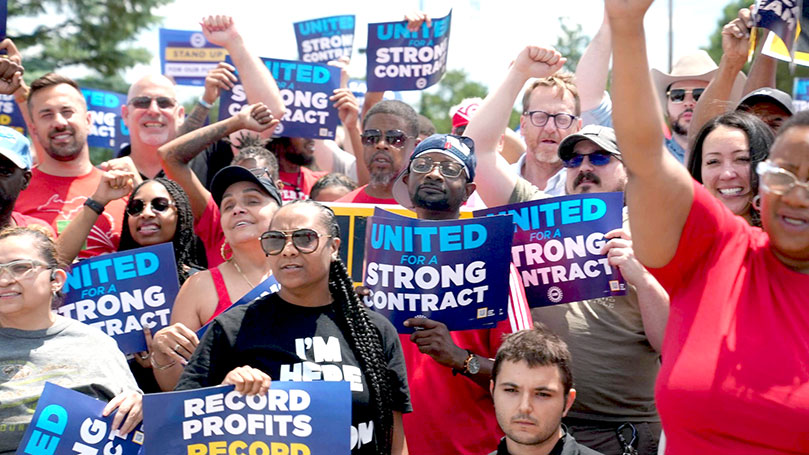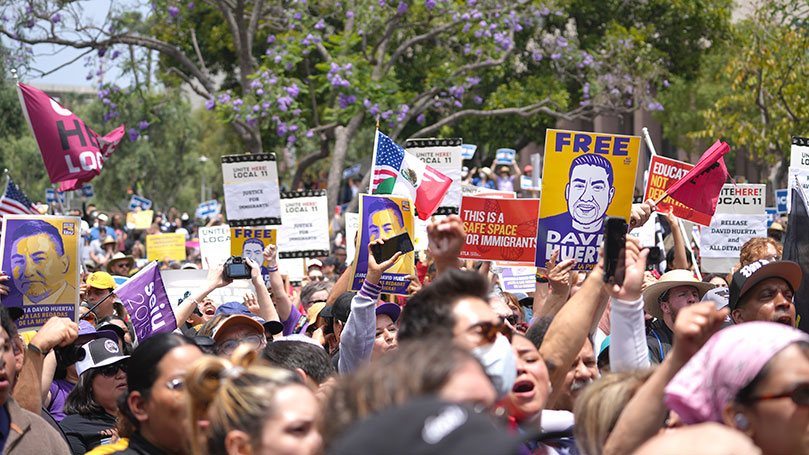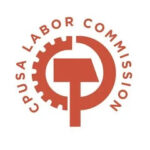
The following report was given by Cameron Harrison on behalf of the CPUSA Labor Commission to the CPUSA National Committee meeting on July 13, 2025. More NC reports here.
Our labor movement stands at a critical juncture. The Trump administration is escalating attacks on working families and our constitutional and democratic rights. Civil service workers face the largest union-busting campaign in U.S. history, immigrant workers endure brutal ICE raids, attacks on diversity and affirmative action at the workplace are ramping up, and corporate monopolies continue their exploitation of the working class while accumulating exorbitant wealth. At the same time, organized resistance is building, demanding an end to the anti-union, anti-worker, anti-migrant policies of the MAGA Trump administration.
With 91% of U.S. workers unorganized, aggressive new union drives are vital for organized labor’s very survival. The current state of new union organizing, while developing in sectors such as auto, higher education, and retail, is far from acceptable. Last year, 107,000 workers in the U.S. participated in an NLRB vote — .06% of those counted. In the private sector, union membership declined by 184,000 in 2024. At the same time, more than 70% of U.S. workers approve of unions and would like to be in a union.
Doubling union density would bring greater working-class power in key industries, reinvigorate rank-and-file workers, and even push more conservative unions to act.
New union organizing and organizing unorganized workers is absolutely essential to meet this political moment. In fact, if we do not, we will be in deep trouble. But if the working class is able to double its union density to 20% through shop floor organizing, this shift would bring greater working-class power in key industries, reinvigorate rank-and-file workers, and even push more conservative unions to act. To achieve this growth requires a conscious intervention and a plan to carry it out. The development of the working class to lead the fights against the most brutal aspects of our constitutional crisis and for a better future demand as much.
National action needed
The Republicans’ so-called “Big Beautiful Bill” is a class war bill that cements corporate control. It strips healthcare from 17 million people, cuts 600,000 care jobs, and forces over 300 rural hospitals to close. Workers with employer insurance will pay nearly $500 more annually (or $2,000 more for families). It also slashes energy and construction jobs, threatening 1.75 million jobs and $148 billion in lost wages — all while raising energy costs for working families.
In response, the AFL-CIO launched a nationwide bus tour this week, which will include rallies in all 50 states. Secretary-Treasurer Fred Redmond explained the tour aims to amplify workers’ voices against federal policies harming working families, starting in swing states. They also continue to call for the passage of the PRO Act, which would strengthen collective bargaining rights and give some teeth to labor law enforcement.
The Coalition of Black Trade Unionists (CBTU) passed a resolution calling for a union day of solidarity and rally, with similar resolutions being passed nationwide. Our Labor Commission has aided this effort. But more needs to be done by all pro-labor forces. We urge the National Committee to mobilize our party and allies for these demonstrations against the class war bill and the attacks on trade union freedoms, workers and oppressed peoples, and women’s democratic rights.
Trump’s executive orders will strip collective bargaining rights from nearly a million federal workers. Our labor movement must unite to protect and extend these fundamental rights — not just through the courts, but through mass mobilization and civil disobedience. These attacks foreshadow broader repression against the entire labor movement, even in the private sector.
Community and workplace struggles
The labor movement isn’t standing still. The Sheet Metal Workers showed up in a big way and publicly fought to free Kilmar Abgrego-Garcia, illegally imprisoned in El Salvador, even leading a May Day protest in Detroit. Ten major unions, representing three million workers, launched a campaign against Trump’s attacks on immigrant and federal workers.

SEIU California President David Huerta’s arrest during an ICE raid revealed to the working-class — again — the administration’s targeting of labor and immigrant leaders. Nationwide protests highlighted the intersection of union-busting and anti-immigrant oppression. The party joined demands to free Abrego-Garcia, to drop the charges against Huerta, and to end ICE’s workplace and community terror.
Strikes are up this year and continuing to heat up.
This spring, class struggle intensified in new and inspiring ways. Strikes are up this year and continuing to heat up. Just this month, 9,000 AFSCME DC 33 sanitation workers walked off the job for the first time in 39 years. They’re sick and tired of being the lowest paid city workers despite being an essential service.
Nearly 100,000 United Food and Commercial Workers International Union (UFCW) grocery workers coordinated bargaining proposals and strike votes against Kroger and Albertsons, driven by rank-and-file and young workers who seek to leverage coordinated bargaining against Big Grocery. These fights centered on poverty wages, unsafe staffing, and healthcare cuts.
Profits vs. people
MAGA and Trump are prioritizing profits over workers’ lives. The unprecedented coordination shown by the UFCW workers has inspired tens of thousands more grocery workers to keep building toward national bargaining coordination. Our party should continue to amplify support for industry-wide organizing and workplace action.
A recent UAW report exposed how the auto monopolies deliberately underused domestic plants to offshore jobs and inflate stock prices. The “Big Three” (General Motors, Ford, and Stellantis) could create 90,000 union jobs by utilizing existing plants, but instead shuttered them for overseas profits. This epitomizes capitalism’s crisis: profits soar while working-class communities suffer. Instead of blaming immigrants and workers in other countries, this report can be used to clarify what is directly responsible for workers’ immiseration — the capitalist system itself.
Trump’s “Liberation Day” tariffs are proving to be divisive in the labor movement. They are forcing unions devastated by deindustrialization into an impossible position. These tariffs, of course, escalate the international class war, pitting manufacturing, retail, and agricultural workers of all countries against each other — a tactic we must expose and resist. International solidarity is key and that is why our commission organized a meeting earlier this year with our fraternal parties in Canada and Mexico to develop cooperation on these issues.
Commission initiatives
The Labor Commission continues to advance our strategy through tools like Labor’s Fight Back, a new pamphlet emphasizing class consciousness and worker-to-worker organizing. Thousands of copies have been distributed, warranting a second printing. We also expanded our labor coverage in People’s World and deepened ties to strategic sectors via our subcommittees (building trades, service, education, and the South). Strengthening our infrastructure in clubs and districts remains critical as we want to develop more of these committees.
The Southern Workers Voice project distributed over 500 copies of this new publication in workplaces and union halls and continues to grow in popularity. Our recent in-person North Carolina conference brought together Southeast trade union activists with a focus on education, strategy, and organizing tactics — alongside labor book sales from International Publishers, including William Z. Foster’s American Trade Unionism. Now we are taking steps towards an in-person conference this fall in Chicago, which will further develop trade union education, rank-and-file mobilization, and party building.
Overall, the working class is accelerating the fight. More recognize the need to assert collective power, despite the challenges. The Communist Party’s role in fighting for working-class leadership in these struggles is crucial. Our task is to fortify these fronts, link them to the broader fight for political and economic democracy, and build class and socialist consciousness.
Images: Challenge Manufacturing workers in Pontiac, Mich. fight for a strong contract by UAW (Facebook); SEIU members fight to free David Huerta by SEIU 721


 Join Now
Join Now